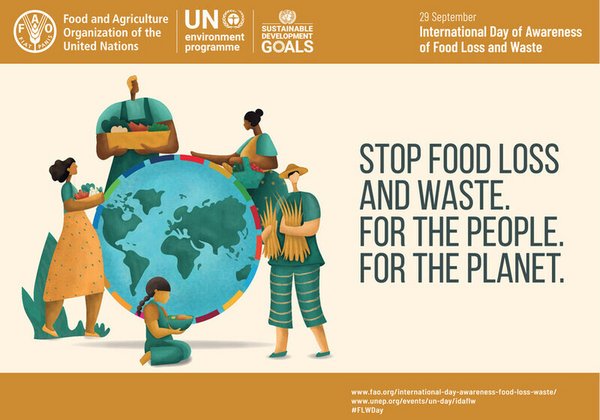- Share this article
- Subscribe to our newsletter
Raising awareness to food loss and waste
Today is the International Day of Awareness of Food Loss and Waste. Reducing food loss and waste are imperative in enhancing the availability of food and contributing to food security, healthy diets and building resilience. Moreover, food loss and food waste reduction serves as a key climate strategy by reducing greenhouse gas emissions (GHGs). According to the Intergovernmental Panel on Climate Change (IPCC), global food loss and waste accounted for 8 to 10 per cent of total anthropogenic GHG emissions during the period 2010-2016.
While hunger and food security continue, an estimated 13 per cent of the world’s food is lost in the supply chain from post-harvest prior to the retail stage of the supply chain, according to the Food and Agriculture Organization of the United Nations (FAO); a further 17 per cent of food is wasted in households, food services and in retail, the United Nations Environment Programme (UNEP) says. Fruits and vegetables account for approximately 32 per cent of food losses, followed by meat and animal products, which make up 12.4 per cent of food losses.
The 2030 Agenda for Sustainable Development – specifically SDG 12, Target 12.3 – calls for halving per-capita global food waste at the retail and consumer levels and reducing food losses along production and supply chains. As custodians of this target, FAO and UNEP measure and monitor progress on efforts to reduce food loss and waste, using two separate indices – the Food Loss Index (FLI), led by FAO, and the Food Waste Index (FWI), led by UN Environment. Target 16 of the Kunming Montreal Global Biodiversity Framework (GBF) also calls for “halving global food waste by 2030”, among other issues.
Edition 4/23 of Rural 21, which appears early in December, is to focus on food loss und waste. How does food loss and waste happen, and what are its global impacts? The magazine will present a wide range of solutions. For instance, post-harvest loss can be avoided by applying modern technologies such as Artificial Intelligence or the Internet of Things. And with new techniques, organic waste can be turned into resources offering people a better income. In this edition, the emphasis will above all be on solutions and innovative ideas addressing the topic.
(FAO/ile/pas)
More information on FAOs Technical Platform on the Measurement and Reduction of Food Loss and Waste website





Add a comment
Comments :